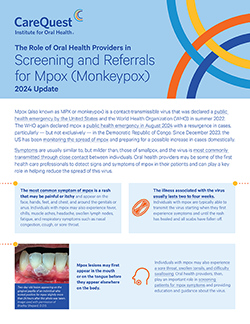Mpox (also known as monkeypox or MPX) lesions may first appear in the mouth or on the tongue and may appear before lesions on other areas of the body. This finding means that oral health providers may be the first health care professionals to detect signs of the mpox virus in their patients, according to an updated report from CareQuest Institute.
Oral health professionals, research suggests, can also play a key role in reducing the spread of this virus. Key points from the report include:
- Individuals with mpox may also experience a sore throat, swollen tonsils, and difficulty swallowing, as well as fever, chills, muscle aches, headaches, fatigue, and respiratory symptoms.
- Most adults are comfortable receiving health screenings from their oral health providers. Screening for the oral lesions associated with mpox is similar to other oral examinations done in a dental office and is likely to be similarly acceptable to dental patients.
- Oral health providers could play an important role in educating patients about the two-dose mpox vaccine and providing appropriate referrals.
In short, oral health providers are in an ideal position to screen for, detect, and educate patients about mpox and, in turn, help reduce the spread of this virus.
You may also be interested in:
- Discussing HPV and Detecting Oral Cancer: The Role of Oral Health Providers, a report summarizing what we know about HPV and oral cancer, and the role of dentists and dental hygienists in patient education and prevention of HPV.
- Missed Connections: Providers and Consumers Want More Medical-Dental Integration, a report examining attitudes about the relationship between oral health and overall health and a desire to connect the siloed care delivery systems.
- Infection Control: Lessons Learned from the new ‘If Saliva Were Red’ Video, a recorded webinar with experts from the Association for Dental Safety who provide an overview on infection prevention and control in oral health, including strategies and equipment to reduce the risk of exposure.
